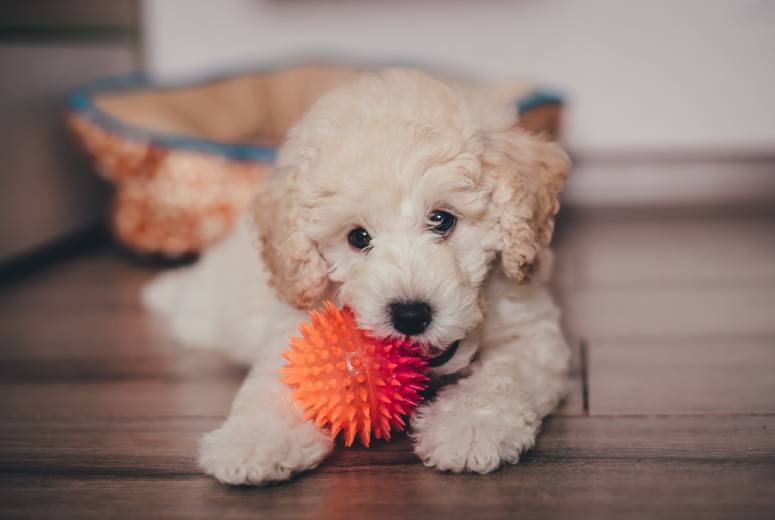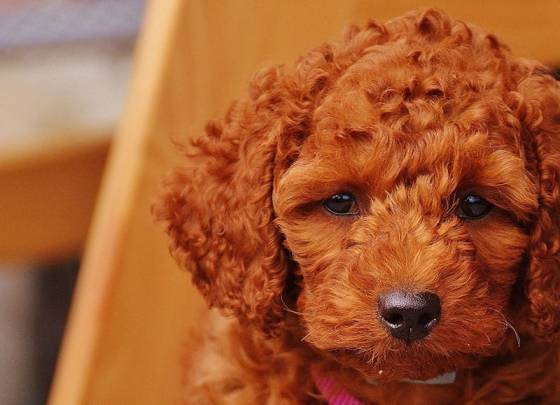Are you looking to adopt a Toy Poodle? Or have you just become the pet parent of a Toy Poodle and have questions about the breed? If so, then read on!
Connect with a verified veterinarian in minutes. Licensed vets are available 24/7 to answer your questions. No need to worry about your furry family member.
We’ve put together this short guide on everything to do with Toy Poodles—from a quick history of the breed, Toy Poodle characteristics and temperament and more! Let’s jump right in!
History of the Toy Poodle
While Poodles are thought to be dogs that are extremely French, that’s not really the case. In fact, these bundles of joy originated in Germany about 400 years ago, where they were bred to retrieve ducks and other water birds. Poodles in that time were known for their athletic skills and their eagerness to please.
Did you know that the dog’s distinctive hair cut originated from their retriever days? It’s a fact! Their pet parents, who were hunters, cut the dog’s hair so they’d have more freedom to move. Hunters shaved their Poodle’s neck, legs and tail, while leaving the rest of the dog’s body covered in fur.
Over time, these little dogs became prized companions to French aristocrats. It’s for this reason that Poodles are perceived as pampered, elegant, dainty dogs. From that time to now, Poodles became loving companions and show dogs. As well as being beautiful, these amazing little dogs are highly intelligent, elegant and make wonderful, loving companions.
What Does the “Toy” Size Mean?
Poodles come in three sizes recognized by the American Kennel Club (AKC):
- Standard: these are the largest Poodles, standing 15 inches or more
- Miniature: these dogs are medium-sized, and stand about 10-15 inches
- Toy: the smallest Poodle, which stands a maximum of 10 inches, but can be smaller
These small dogs were selectively bred in 18th century England, and were bred from smaller Miniature Poodles, resulting in the small, highly intelligent, curly-haired dog we all love!
In addition to their small size, Toy Poodles have an average lifespan of 12-15 years. So, you’ll have a loving little companion for years to come if you adopt a Toy Poodle!

Review symptoms, medications & behavior to keep your pets healthy with a Vet Online in just minutes.
Ask a Vet Live NowToy Poodle Characteristics and Temperament
You’ll find these little dogs to be extremely affectionate and confident; they’ll follow you around, almost as close as your shadow. Toy Poodles are also very friendly but may not be friendly with other pets. They’re also very playful and have a lot of energy, though they will be just as happy to sit in your lap and be loved on.
When it comes to coat colors, Toy Poodles come in the same colors as other Poodles. These include blues, grays, browns, creams, and in various shades of these colors. The most popular colors for Toy Poodles are red or black.
You’ll be happy to hear that Toy Poodles don’t shed very much, making this a good dog for some people who have allergies. Poodles tend to have wiry, curly hair that’s quite pretty. However, these dogs do require regular grooming which includes brushing and combing their hair, and regular hair cuts from a groomer (unless you know your way around dog clippers). Without the right care, these fur babies can end up with extremely matted hair, ear infections or even eye problems if fur is constantly in their eyes.
Toy Poodles are highly intelligent and very adaptable. In fact, they can thrive in a city living in an apartment or living in a more rural setting. While Toy Poodles have great personalities, they do bond deeply with their pet parents. These dogs are made to be companions, so if they’re left alone for long hours, they can develop separation anxiety. This can lead these tiny dogs to become very destructive. If you need to be away from home much of the day, this may not be the right dog for you.
Poodles are very trainable and are very eager to please. They love to work right alongside their pet parents! They are also known for having low aggression levels, which helps them to socialized with other pets and children. However, if you have small children, it’s best to not leave your kids alone with a Toy Poodle or any other dog. And keep in mind that because Toy Poodles are so small, they can easily be hurt by kids or other pets.
One more thing—many people believe that all small dogs tend to bark a lot; however, you’ll be happy to know that Toy Poodles are not big on barking.
Toy Poodles & Exercise Requirements
These little dogs are highly athletic and can be active, so they require plenty of exercise and mental stimulation. While this is the case, they also don’t need as much exercise as larger dogs. Keep in mind that these fur babies are small and easily hurt. If they have too much strenuous exercise, they can develop sprains and other injuries.
Most Toy Poodles will be quite happy with at least 30 minutes of exercise a day. They love to go on walks and enjoy playing.
Training & Toy Poodles
These small dogs need positive reinforcement when they’re being trained. Rewards can include treats, toys and plenty of praise and love. Poodles enjoy training, so you’ll most likely have an easy time with them.
However, keep in mind that these are highly intelligent dogs. For this reason, Toy Poodles need plenty of mental stimulation. This can include games, puzzle toys and more. Oh, and they’ll love tagging along on day trips with you, too!
Toy Poodle Health
Toy Poodles can suffer from genetic disorders including:
- Progressive retinal atrophy (which can lead to blindness if not treated)
- Hip dysplasia
- Addison’s disease
You can avoid some of these issues by adopting your Toy Poodle from a reputable breeder. These breeders test the puppies for certain health issues that are more common. In fact, you can ask them to provide you a certificate stating that the dog/puppy has been tested and found free of genetic health problems.
Toy Poodle Diet
Toy Poodles, being smaller dogs, don’t need a lot to eat each day and don’t have the same calorie requirements as larger dogs. In fact, Toy Poodles have a tendency to become overweight or obese if they eat too much and/or don’t have enough exercise.
These little bundles of love need a dog food that’s high in protein and fiber; however, be sure to avoid dog foods that contain fillers such as corn, bran, oats, and more. Some dogs may benefit from a diet that includes both meat and veggies (as long as these are safe for dogs).
Toy Poodles are highly intelligent, love you deeply and enjoy spending time with you. They can be great family dogs, but if you have small kids, this may not be the right dog for you because Toy Poodles are fragile and easily injured.
Even so, these lovely little dogs make wonderful, fun companions. If you’re looking for a small dog, why not consider a beautiful Toy Poodle? You’ll have a friend for years to come!
Connect with a verified veterinarian in minutes. Licensed vets are available 24/7 to answer your questions. No need to worry about your furry family member.

Tom
Tom has always loved to write since he was little - he wanted to be either a writer or a veterinary doctor, but he ended up being a professional writer while most of his works are based on animals. He was born in San Francisco but later moved to Texas to continue his job as a writer. He graduated from the University of San Francisco where he studied biotechnology. He is happily married and a soon to be father!
Review symptoms, medications & behavior to keep your pets healthy with a Vet Online in just minutes.
Ask a Vet Live Now



